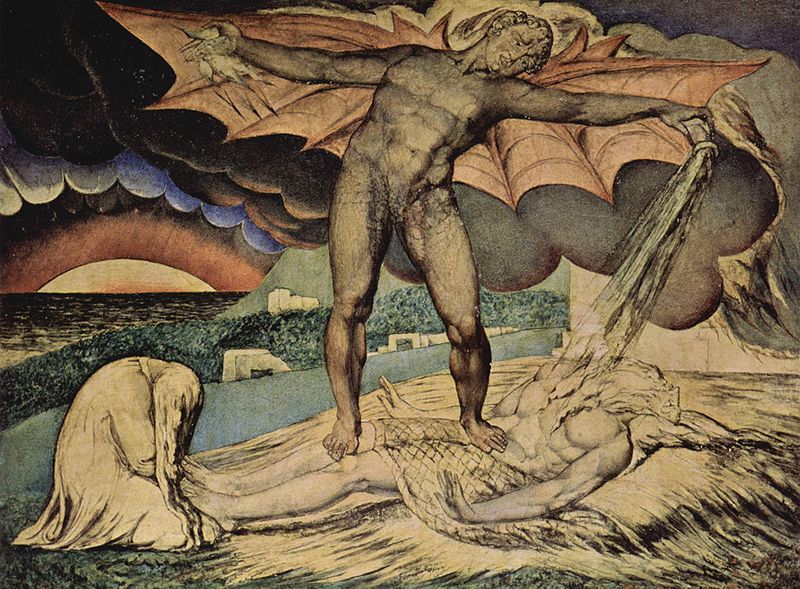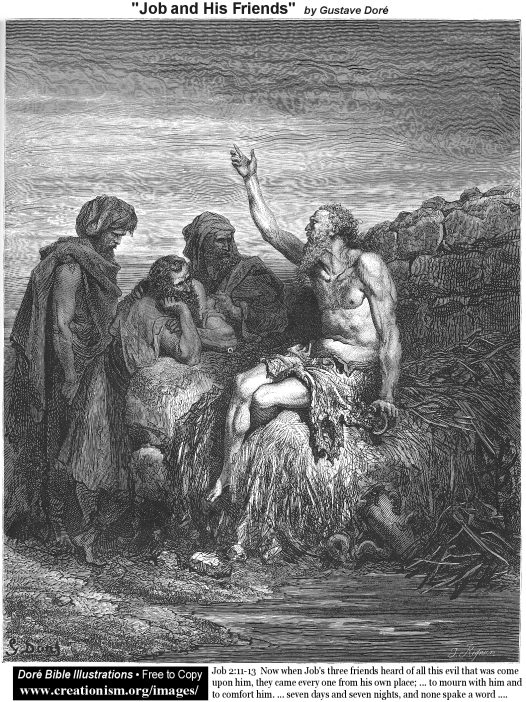Job in de Tenach

William Blake
In de Tenach wordt Job beschreven als een gezegend, rijk man, die Godvrezend is. God staat satan toe hem te gronde te richten. Job verliest zijn hele hebben en houden; zijn kinderen, zijn rijkdom en zijn gezondheid. Hij wordt tot het uiterste op de proef gesteld, maar blijft aan zijn geloof vasthouden. Het grootste deel van het boek Job is de poëtische weergave van een gesprek tussen Job en drie vrienden. Deze vrienden houden vol dat Jobs noodlot het gevolg is van diens zonden, Job betuigt zijn onschuld. Job wordt uiteindelijk openlijk door God in zijn eer hersteld, zijn vrienden hadden het niet bij het rechte eind. Job leeft hierna nog 140 jaar, over zijn uiteindelijke leeftijd wordt niet geschreven.
Binnen het jodendom wordt Iyyov gezien als een sterke persoonlijkheid en er zijn opvattingen dat hij een der drie adviseurs van de farao zou zijn geweest ten tijde van de geboorte van Mosje. Volgens een vertelling uit de Talmoed zou Job hebben gezwegen omtrent het doden van mannelijke baby's, waarop God hem gestraft zou hebben.
nl.wikipedia.org/wiki/Job_(persoon)#Job_in_de_Joodse_traditie
en.wikipedia.org/wiki/Job_(biblical_figure)
¤¤¤¤¤¤¤¤¤¤¤¤¤¤¤¤¤¤¤¤¤¤¤¤¤¤¤¤¤¤¤¤¤¤¤¤¤¤¤¤¤¤¤¤¤¤¤¤¤¤¤¤¤¤¤¤¤¤¤¤¤¤¤¤¤¤¤¤¤¤¤¤¤¤¤¤¤¤¤¤
"My dear friend,” I said, “suicide can never be a mass movement.”
“How can you be so sure? What was the Battle of Verdun if not mass suicide?”
“People there hoped for victory.”
“What victory? They stationed a hundred thousand men and were left with sixty thousand graves.”
“Some survived. Some received medals.”
“Perhaps we should create a suicide medal?”
“You’ve remained a world-saver,” I said. “Suicide is committed alone, not with partners.”
“I read somewhere that in America there are suicide clubs.”
“For the rich, not for the poor.”
He laughed and exposed a toothless grin. He spat out his cigarette butt and stepped on it.
“So what should I do?” he asked. “Become rich? Perhaps I should. It would, actually, be like Job.”
from : www.newyorker.com/online/blogs/books/2012/08/job-isaac-bashevis-singer.html

The
theme of the biblical Book of Job is the “sufferings of the just,” and
the topic–the case, we might say–of Job seemed to possess Jung. For
although he subsequently studies in Answer to Job the evolution
of the God-image grounded in Daniel, Isaiah, Ecclesiastes (and the
apocryphal Ecclesiasticus), and Revelation, the core of Jung’s
discussion is the plight of Job himself and God’s response to it. For
the nonreligious, the Book of Job can be read as not only about the just
and the religiously faithful, but about the sufferings of the innocent,
regardless of religious persuasion. God takes everything from Job, and
the biblical book is a lament, much like many of the psalms, which come
just after it in the Bible. The psalms, of course, have many dimensions,
but the psalmist(s), like Job, often wonder what they have done to
deserve their various plights and repeatedly ask when, after all, God
will finally make an appearance to save them from “the Pit,”
crush their enemies, forgive them, and so on (“How long, O Lord?”). The
feeling in many of the psalms, and certainly the feeling of Job,
resembles those guilt-ridden and helpless-feeling dreams where one seems
unfairly accused of a crime and protests one’s innocence in vain. As
Job says, “ I know I am not what I am thought to be” (9:35), “You know
that I am not guilty” (10:7), and, more hopefully, “I know that my
redeemer [vindicator] liveth” (19:25).
God as Narcissist
Job’s innocence
is indeed righteous, and the tricky thing about his unfair fate, as
Jung zeroes in on, is that the Devil made God do it. Somewhat like the
serpent manipulating the first woman and man in the Garden of Eden,
Satan challenges God to test Job’s faith by inflicting maximum suffering
on this innocent civilian. Satan bets God that Job will then “curse
thee to thy face.” God takes the wager, at the obvious and total expense
of Job.
Aucun commentaire:
Enregistrer un commentaire